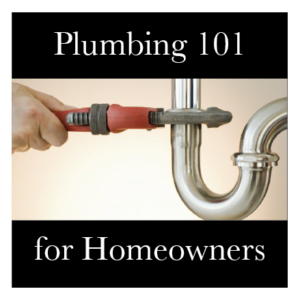If you own your own home, it may be beneficial to have a small amount of plumbing knowledge to help prevent costly repairs in the future. The following tips should be enough to help you with the most common plumbing issues homeowners face.
- Know how to turn off your main water valve. If you ever have a leak in your home, you’ll want to turn off your main water valve to prevent water damage. Be sure to show everyone in your household where the main water valve is located and how to switch it to the off position in case of an emergency. You may also want to learn where all of the other valves are for your other appliances, such as, your hot water heater, dishwasher, toilet, sinks, etc.
- Know what you should not put down your drain. You should avoid putting any oils or fats down your drains because they most commonly lead to annoying drain blockage. Some examples of these oils/fats are grease from meats, cooking oil, butter, and salad dressings. Instead you can mix the oils with something like coffee grounds or used paper towels and dispose of it in the garbage. Even rinsing off greasy pots and pans can be bad for your drain, so try to absorb as much grease as you can with a paper towel before cleaning these dishes in your sink or dishwasher.
- Know what you should not put down your garbage disposal. It’s tempting to put everything possible down the garbage disposal, that’s what it’s there for right? Not exactly. There are certain things that aren’t good for your garbage disposal. These include: oils/fats, stringy vegetables and peels, pasta and rice, egg shells, coffee grounds, fruit pits and seeds, bones and shellfish shells. These items can damage the blades of the garbage disposal or end up clogging the drain.
- Know your plungers. Did you know different types of plungers are used for different jobs? First, we have your standard plunger. This is probably what most people think of when they think of a plunger. The small suction cup at the end of the handle works best for flat surfaces, like a sink or shower drain. Next, we have a flanged plunger, which is best for toilets since they do not have a flat surface. The shape at the end helps the plunger seal to the bottom of the toilet and allows more force to clear the clog. Lastly, we have the accordion plunger. The design of this plunger allows it to force more water through your drain to clear tougher clogs.
- Keep your gutters and outside drains clear of debris. This will insure that all drains and gutters remain clear and unclogged throughout the year. Also, if you find any puddles of water on the ground this could mean you have an underground leak.
We hope these tips are helpful and we thank you for reading. If you ever find a plumbing problem you can’t take on yourself, give ASI Plumbing a call, we’d be happy to help – 502-271-1331.


 Over 1800 Trusted Reviews
Over 1800 Trusted Reviews 


